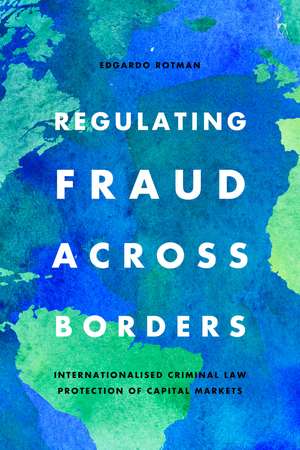Regulating Fraud Across Borders: Internationalised Criminal Law Protection of Capital Markets
Autor Edgardo Rotmanen Limba Engleză Hardback – 24 feb 2021
| Toate formatele și edițiile | Preț | Express |
|---|---|---|
| Paperback (1) | 297.00 lei 6-8 săpt. | |
| Bloomsbury Publishing – 19 oct 2022 | 297.00 lei 6-8 săpt. | |
| Hardback (1) | 568.40 lei 6-8 săpt. | |
| Bloomsbury Publishing – 24 feb 2021 | 568.40 lei 6-8 săpt. |
Preț: 568.40 lei
Preț vechi: 815.72 lei
-30% Nou
Puncte Express: 853
Preț estimativ în valută:
108.80€ • 118.22$ • 91.45£
108.80€ • 118.22$ • 91.45£
Carte tipărită la comandă
Livrare economică 21 aprilie-05 mai
Preluare comenzi: 021 569.72.76
Specificații
ISBN-13: 9781509943197
ISBN-10: 1509943196
Pagini: 216
Dimensiuni: 156 x 234 mm
Greutate: 0.48 kg
Editura: Bloomsbury Publishing
Colecția Hart Publishing
Locul publicării:London, United Kingdom
ISBN-10: 1509943196
Pagini: 216
Dimensiuni: 156 x 234 mm
Greutate: 0.48 kg
Editura: Bloomsbury Publishing
Colecția Hart Publishing
Locul publicării:London, United Kingdom
Caracteristici
Examines key institutional and state actors such as the EU, the IOSC and key jurisdictions including the US, the UK, Switzerland, France, Italy, and Germany.
Notă biografică
Edgardo Rotman is Senior Lecturer in International and Comparative Law Emeritus at the University of Miami School of Law, USA.
Cuprins
Introduction 1. The Internationalisation Process I. The Concept of Legal Internationalisation II. Extraterritorial Application of National Law III. International Cooperation IV. Mutual Recognition V. The Diffusion of the American Legal Model VI. Suppression Treaties and Conventions VII. Internationalisation through EU Directives and Regulations VIII. Harmonisation IX. Transnationalisation as a Subcategory of Legal Internationalisation Lato Sensu A. Transnational Law in General B. Transnational Criminal Law C. 'Transnationalisation' X. Economic Underpinnings A. The Globalisation of Financial Markets B. Relationship between the Economy and Business-Related Criminality XI. Social and Psychological Underpinnings: White-Collar Criminality in the Context of a Globalised Economy 2. The Internationalisation of Securities Fraud-Related Criminal Law in General I. Introduction II. Securities Fraud as a Criminal Offence A. The Concept of 'Securities' B. The Concept of 'Securities Fraud' in American Law C. Criminal Securities Fraud in American Law III. Critical Statutory Interpretation A. Shortcomings of American Legal Scholarship in the Field of Criminal Securities Frauds B. The Use of Comparative Criminal Law to Rethink and Reform the Doctrine of Criminal Liabilityin American Securities Law 3. Extraterritorial Application of United States Law I. Introduction II. The Crucial Role of Extraterritorial Enforcement of the United States Criminal Law in the Prevention and Repression of Financial Fraud A. Evolution of the Notion of Extraterritoriality B. Extraterritoriality of Business-Related Criminal Law in a Globalised Economy C. The Pros and Cons of Extraterritorial Enforcement of Business-Related Criminal LawIII. Overview of United States v Vilar's Fundamental Precedents A. United States v Bowman B. Morrison v National Australia Bank C. Morrison's Casualties D. The United States Congress Attempt to Overrule Morrison IV. Critical Analysis of United States v VilarA. United States v Vilar B. How a Comparative Analysis of the German Criminal Law Model can Help Identify Signifi cant Shortcomings in United States v Vilar V. Discussion of Each of United States v Vilar's Supporting Arguments A. First Critique of Vilar i. Extent and Significance of the Bowman Exception ii. The Presumption Against Extraterritoriality Called into Question B. Second Critique of Vilar C. Third Critique of Vilar D. Fourth Critique of Vilar E. Conclusion 4. The Internationalised Repression of Insider Trading I. The United States Law on Insider Trading II. The Internationalisation of Insider Trading Law III. Switzerland IV. European Union V. FranceA. Historical and Institutional Background B. Past Developments on the Insider Trading Prohibition C. Present Regulation of Insider Trading D. Constitutionality of the Accumulation of Administrative and Criminal Sanctions VI. United Kingdom VII. Italy VIII. Germany A. Development of Insider Trading Law in Germany B. Effectiveness of Insider Trading Provisions C. Recent Reforms 5. The Internationalised Repression of Stock Market Manipulation I. Introduction II. Market Manipulation in the United States III. Traditional Forms of Market Manipulation IV. New Forms V. Benchmark Manipulation A. Significance: LIBOR and its Replacement B. EU Benchmarks Regulation VI. Swiss Criminal Law: Internationalisation of the Market Price Manipulation Prohibition through the Diffusion of the American Model VII. European Regulation of the Market Manipulation Prohibition VIII. Developments in Some EU Member States Towards Adjusting to European Regulation A. France i. Legislative Developments ii. Constitutionality of the Accumulation of Criminal and Administrative Sanctions Dealing with Market Manipulation B. United Kingdom C. Italy i. Legislative Developments ii. The Two-Track Sanctioning System and the Principle Non Bis in Idem D. Germany Conclusions
